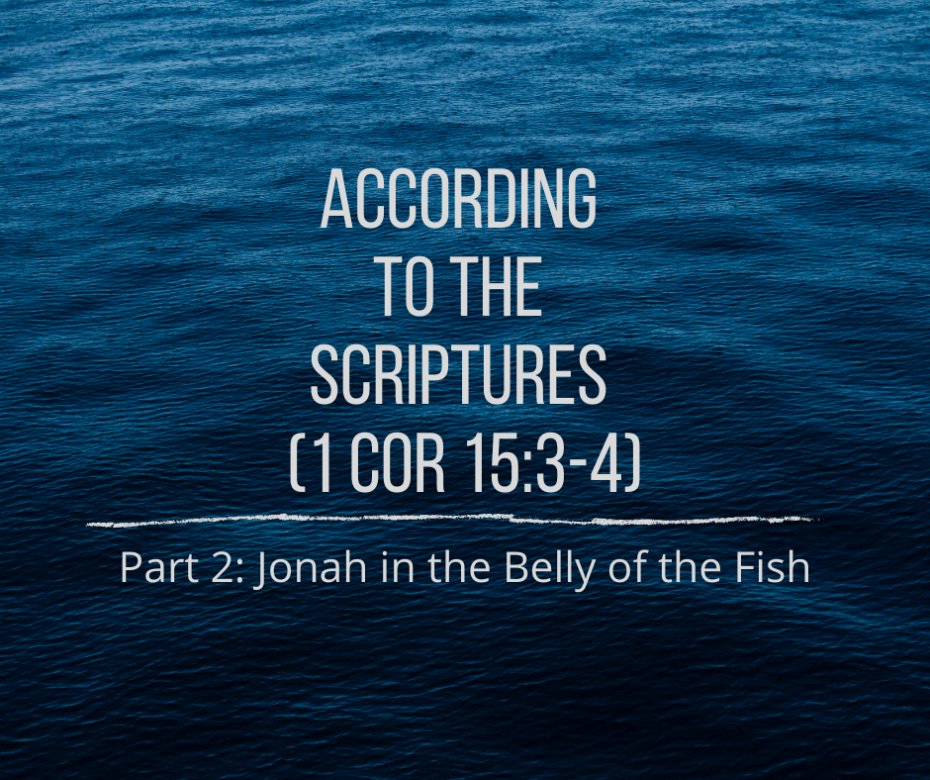For I delivered to you first of all that which I also received: that Christ died for our sins according to the Scriptures, and that He was buried, and that He rose again the third day according to the Scriptures (1 Cor 15:3-4).
In the last blog, I explored some of the OT verses that Paul might have used to prove the Messiah had to die for sin, be buried, and be resurrected from the dead. However, I didn’t explore the Scriptures that teach Messiah would have to be raised on the third day. Where is that taught in the OT?
The difficulty is, there is no specific OT prophecy cited by NT authors to prove that. So what text(s) was Paul thinking of?
He might have been thinking along the lines of something Jesus said about the “sign of Jonah”:
Then some of the scribes and Pharisees answered, saying, “Teacher, we want to see a sign from You.” But He answered and said to them, “An evil and adulterous generation seeks after a sign, and no sign will be given to it except the sign of the prophet Jonah. For as Jonah was three days and three nights in the belly of the great fish, so will the Son of Man be three days and three nights in the heart of the earth. The men of Nineveh will rise up in the judgment with this generation and condemn it, because they repented at the preaching of Jonah; and indeed a greater than Jonah is here (Matt 12:38-41).
Jesus says Jonah is a “sign” of what would happen to Him, due to the “three days and three nights” that Jonah spent in the belly of the fish (cf. Jonah 1:17). A sign is a miracle or unusual event. But how is Jonah a sign of Messiah, specifically his third-day resurrection?
Here’s what I found—
First, the events and actions of a prophet’s life can have prophetic meaning. For example, God commanded Isaiah to preach barefoot and naked as a sign against Egypt and Cush who would be taken as captives (Isa 20:3-4); Hosea was commanded to marry a prostitute, as a symbol of Israel’s harlotry (Hos 1:2); and Ezekiel was commanded to lie on his left and right sides, to represent the punishment that was coming upon the Northern Kingdom and Judah (Ezekiel 4). God gave a prophetic message through their actions. However, in each of those cases, God also gave the interpretation of the actions—we don’t have that kind of explanation in the book of Jonah itself. However, Jesus said that Jonah was a sign of what would happen to “the Son of Man.” Is the Lord giving the prophetic meaning of the events of Jonah’s life? It seems so. In which case, Jonah is not a type of Christ (as is usually thought), so much as a symbolic prophecy of Christ. That may explain Jonah’s unusual narrative format. Why is Jonah a story instead of a collection of prophecies? It may be that Jonah’s story is the prophecy!
Second, notice that Jesus situates Jonah’s story in the context of resurrection. Although the Ninevites of Jonah’s day were long dead, Jesus foretold of a time when they would “rise up” (i.e., be resurrected), and sit in judgment over Israel. “Rise up” comes from anistēmi which can simply mean “stand up,” but it can also refer to being raised from the dead, as it does in Mark 8:31; 9:9, 10, 27, 31; 10:34; 12:25; 16:9; and elsewhere.
Third, the text suggests that Jonah died in the belly of the fish. Jonah began to pray while still alive (2:1), but as Brant Pitre notes, “the author of the book never claims that Jonah remained alive for three days and three nights in the fish” (The Case for Jesus, p. 186). Horace Hummel recognizes the song of Jonah in chap. 2 “heaps up quite a number of traditional expressions for ‘death’ or judgment” (The Word Becomes Flesh, p. 327). Jonah cries “Out of the belly of Sheol” (v 2), he is buried (“The earth with its bars closed behind me forever,” v 6b), and then his life is brought up “from the pit” (v 6c), which are “standard Old Testament terms for the realm of the dead” (The Case for Jesus, p. 187). In other words, could it be that when the fish vomited Jonah unto dry land, “it is vomiting up his corpse” (The Case for Jesus, p. 187)? Interestingly, God then says to Jonah, “Arise” (3:3). That could just mean “get up” as it does in 1:3, but the word [qum] is the same one Jesus uses to raise Jairus’ daughter from the dead:
Then He took the child by the hand, and said to her, “Talitha, cumi,” which is translated, “Little girl, I say to you, arise” (Mark 5:41).
Putting these pieces together, Pitre thinks that after the fish spat up Jonah’s corpse, God raised him from the dead. If so, that would be an amazing miracle that fits the language of the text (i.e., all the terms for death), the facts of his accident (i.e., you cannot survive what Jonah experienced), and the prophetic meaning that Jesus assigns to his life (that Jonah’s story is a sign of the Messiah’s death, burial, and resurrection after three days and three nights).
In sum, the Apostle Paul said that the Messiah would rise again the third day according to the OT Scriptures. Which passage was he thinking of? I recognize that this interpretation is somewhat speculative, but it looks like Paul was thinking of Jonah. As Jesus Himself suggested, the events of Jonah’s life had prophetic meaning for the death, burial, and third-day resurrection of Messiah.


